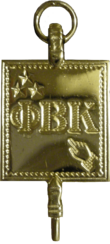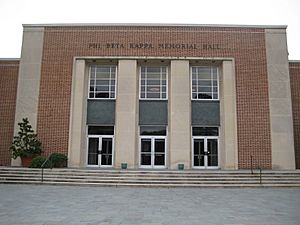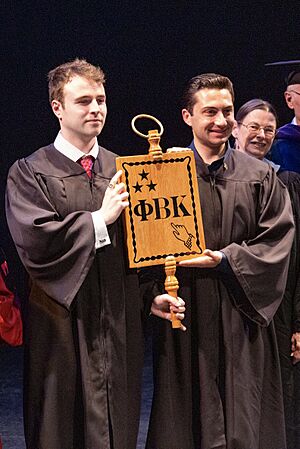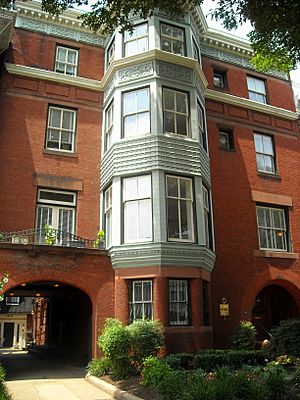Phi Beta Kappa facts for kids
Quick facts for kids Phi Beta Kappa |
|
|---|---|
| ΦΒΚ | |
 |
|
| Founded | December 5, 1776 College of William & Mary |
| Type | Honor society |
| Affiliation | HSC |
| Emphasis | Liberal arts and sciences |
| Scope | National (United States) |
| Motto | Φιλοσοφία Βίου Κυβερνήτης Philosophia Biou Kybernētēs "Love of learning is the guide of life" |
| Colors | Pink and Sky blue |
| Publication | The American Scholar |
| Chapters | 293 |
| Members | 500,000+ lifetime |
| Headquarters | 1606 New Hampshire Avenue NW Washington, DC 20009 United States |
The Phi Beta Kappa Society (ΦΒΚ) is the oldest academic honor society in the United States. It started in 1776 at the College of William & Mary in Virginia. Phi Beta Kappa helps promote and support great work in the liberal arts and sciences. It also invites excellent students from these subjects at certain American colleges and universities to join. Many famous people have been members. This includes 17 U.S. presidents, 42 U.S. Supreme Court justices, and 136 Nobel laureates.
Contents
History of Phi Beta Kappa
How Phi Beta Kappa Started

The Phi Beta Kappa Society had its first meeting on December 5, 1776. Five students at the College of William & Mary in Williamsburg, Virginia, started it. John Heath was their first President. This group was the first to name an American college society using the first letters of a secret Greek motto.
The students often met at the Raleigh Tavern, which was off campus. Some people thought a Masonic group also met there, but the Freemasons used a different building. Some early Phi Beta Kappa members did join the Freemasons later in life.
It's not fully known why the students formed the group. They might have wanted to meet freely and talk about different topics. Or they might have discussed politics during the American Revolution. Early records show they debated and practiced public speaking. These topics were similar to what they studied in class.
One initiation message from 1779 told new members: "here then you may for a while disengage yourself from scholastic cares and communicate without reserve whatever reflections you have made upon various objects; remembering that everything transacted within this room is transacted sub rosa, ... here, too, you are to indulge in matters of speculation that freedom of inquiry which ever dispels the clouds of falsehood by the radiant sunshine of truth...". This meant they could speak freely and secretly about ideas.
Older College Groups
Before Phi Beta Kappa, other groups existed at the College of William & Mary. The F.H.C. Society, also called "the Flat Hat Club", began in 1750. It was the first secret college society in North America. Unlike Phi Beta Kappa, F.H.C. used Latin letters for its name. Its name came from the first letters of a Latin motto.
Another Latin-letter group at William & Mary was the P.D.A. Society. People publicly called it "Please Don't Ask". John Heath, who helped start Phi Beta Kappa, may have tried to join P.D.A. but was refused. Or he might have chosen not to join it. A friend of his, William Short, later wrote that P.D.A. was known only for its parties, not for learning.
A Secret Society Spreads
The founders of Phi Beta Kappa wanted their society to be "purely of domestic manufacture". This meant it had no connection to anything European. They said the society was for friendship and good company. Its main ideas were "friendship as its basis and benevolence and literature as its pillars."
The College of William & Mary temporarily closed in early 1781. This happened because the British tried to take back the American colonies. Phi Beta Kappa also stopped meeting for a short time. But a person named Elisha Parmelee, who went to Yale College and Harvard College, visited Williamsburg. He took permission from Phi Beta Kappa to start new branches of the society at his schools.
A second chapter began at Yale College in late 1780. A third started at Harvard College in 1781. And a fourth was founded at Dartmouth College in 1787.
Phi Beta Kappa was a secret society. This helped protect its members and made them feel united. The society's motto was Φιλοσοφία Βίου Κυβερνήτης. In English, this means "Love of learning is the guide of life". Greek was chosen because it was the language of science in Roman times. In May 1777, members created a secret handshake. This allowed them to recognize each other "in any foreign country or place."
Becoming an Academic Honor Society
More chapters opened at Union College in 1817, Bowdoin College in 1825, and Brown University in 1830. The first chapter at William & Mary also reopened. In 1831, the Harvard chapter made the society's secrets public. This happened during a time when many people were against secret groups like the Masonic lodges.
The first chapter started after Phi Beta Kappa became an "open" society was at Trinity College in Connecticut in 1845. The University of Alabama started a chapter in 1851. Before the Civil War, chapters often invited famous speakers. Ralph Waldo Emerson's 1837 speech at Harvard, "The American Scholar", is one of the most famous.
Phi Beta Kappa was the first college group to use a Greek-letter name. Because of this, it is seen as a model for modern college fraternities. It also set the example for later college honor societies. Over time, other "social" fraternities became popular. This made Phi Beta Kappa focus more on academics, turning it into the honor society it is today.
By 1883, when the United Chapters of Phi Beta Kappa were formed, there were 25 chapters. The first women joined the Society at the University of Vermont in 1875. The first African-American member, George Washington Henderson, joined at the same school two years later. In 1885, Phi Beta Kappa decided that engineering students could not join. This rule is still in place today.
Each chapter is named by its state and a Greek letter. The letter shows its order of founding in that state. For example, Alpha of Pennsylvania is the chapter at Dickinson College, founded in 1887. Beta of Pennsylvania is at Lehigh University, founded later that year. By 1920, there were 89 chapters. Phi Beta Kappa was one of six honor societies that helped start the ACHS in 1925. However, it left ACHS in 1937 to be an independent society again.
Phi Beta Kappa Today
In 1988, the United Chapters of Phi Beta Kappa officially changed its name. It became The Phi Beta Kappa Society, going back to its original name from 1776.
In the 1990s, some reports suggested that fewer students were accepting invitations to join Phi Beta Kappa. This was seen at places like the University of Connecticut. One reason given was that more students were the first in their families to go to college. These students might not have heard of the society before. Also, some students at the University of California at Berkeley in 1970 felt unsure about the honor.
A 1997 article pointed out that Phi Beta Kappa was not well-represented at historically black colleges and universities. This was partly because of a rule requiring 10 faculty members at a university to be existing members. Historically, Black faculty faced challenges getting into universities where they could become members.
In 2008, the Phi Beta Kappa Society received an award for supporting the arts and sciences. This award recognized its strong belief in the value of a liberal arts education. Today, Phi Beta Kappa works with other old and respected honor societies. They form a group called the Honor Society Caucus. This group includes Phi Beta Kappa, Phi Kappa Phi, Sigma Xi, and Omicron Delta Kappa.
Symbols of Phi Beta Kappa

The Greek letters Phi Beta Kappa stand for Φιλοσοφία Βίου Κυβερνήτης. This means "Wisdom is the guide of life".
The main symbol of the Phi Beta Kappa Society is a golden key. On the front of the key, there is a pointing finger, three stars, and the Greek letters. On the back, you will find the letters "SP". Some historians believe "SP" stood for Societas Philosophiae, meaning "Philosophical Society". They think this was the society's first name.
The "key" did not start as a copy of a watch key. The first symbol was a larger silver medallion. It was a square piece of metal with a loop. Members wore it around their necks on ribbons. This was similar to how older groups wore their symbols. Later, the medallion became smaller. Men then started wearing it on their watch chains as fobs.
Some details on the key have stayed the same since the beginning. These include the stars, the pointing hand, and the Greek letters. But there are also differences between older keys and new ones. The name of the person who received the key was not engraved on the earliest ones. This started in the early 1800s. The name of the school was also not always on the early keys. Sometimes, the only way to know which school a key came from is to look up the recipient's name in old school records.
The number of stars on the front has also changed. There were never fewer than three, but some old keys have as many as twelve. The meaning of the stars in these early cases varied by chapter. Also, the date the honor was given only started appearing on keys in the mid-1800s. The date December 5, 1776, is on all keys. This is the date the society was founded, not the date a specific key was given. In 1912, the key was made to a standard size and look. It became golden, and it always included the school's name, the recipient's name, and the award date.
Activities of the Society
Publications and News
The Phi Beta Kappa Society publishes The Key Reporter. This is a newsletter sent out four times a year to members who donate money. It is sent twice a year to all other members. The society also publishes The American Scholar. This is a journal that comes out four times a year. It has essays about literature, history, science, public affairs, and culture.
Awards and Fellowships
Phi Beta Kappa gives out several book awards each year. These are the Ralph Waldo Emerson Award, the Christian Gauss Award, and the Phi Beta Kappa Award in Science. These awards go to excellent scholarly books published in the United States. The winning books cover humanities, social sciences, natural sciences, and math. They must be interesting to many people and easy for general readers to understand. Each award comes with a $10,000 prize.
The Dr. Martin R. Lebowitz and Eve Lewellis Lebowitz Prize is for achievements in philosophy. It is given by Phi Beta Kappa with the American Philosophical Association. This prize recognizes great philosophical thinking. Winners have received as much as $25,000 each.
The Mary Isabel Sibley Fellowship is given every year. It switches between Greek and French studies. This award helps women study Greek language, literature, history, or archaeology. Or it helps them study French language or literature. The fellowship gives $20,000 to help with studies and living abroad.
The Walter J. Jensen Fellowship helps educators and researchers improve French language, literature, and culture education in the U.S. This fellowship supports at least six months of study in France. The stipend for 2016 was $15,500. The Romanell-Phi Beta Kappa Professorship is given yearly to scholars in philosophy. It recognizes great work and how they help the public understand philosophy.
Special Programs
Since 1956, the Phi Beta Kappa Visiting Scholar Program has allowed college students to meet famous scholars. This program helps share ideas between the visiting scholars and the college's teachers and students. Phi Beta Kappa also has a National Arts & Sciences Initiative. This program uses its network of members and chapters across the country. It connects with leaders, shares the value of arts and sciences, and supports policies that strengthen this type of education.
Membership in Phi Beta Kappa
Phi Beta Kappa has chapters at about 10% of American colleges and universities. Only about 10% of students who graduate with arts and sciences degrees from these schools are invited to join. Most students are chosen in their senior year. But some colleges pick a small number of very top students in their junior year. This is usually less than 2% of the class. Some chapters also invite graduate students with excellent academic records to join.
Each chapter sets its own academic rules. But all new members must have studied liberal arts and sciences. They must also show "good moral character". Usually, they need grades that put them in the top tenth of their class. However, at least one school, Princeton University, includes engineering students in Phi Beta Kappa. There is a required fee to join, which was between $50 and $95 in 2005. Sometimes, the university pays this fee for the student. To join, students usually need a very high grade point average (GPA), at least 3.8 out of 4.0. In 2001, members voted to make the GPA requirements even stricter.
Chapters of Phi Beta Kappa
Phi Beta Kappa has 293 chapters across the United States. New chapters are approved at special meetings held every three years.
Notable Members
Since it started, many important people have been members. This includes 17 U.S. Presidents, 42 U.S. Supreme Court Justices, and over 136 Nobel Laureates.
See also
 In Spanish: Phi Beta Kappa para niños
In Spanish: Phi Beta Kappa para niños
- College literary societies
- Honor society
- Phi Beta Kappa Award in Science
- Phi Kappa Phi


